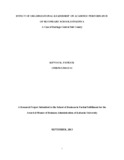EFFECT OF ORGANIZATIONAL LEADERSHIP ON ACADEMIC PERFORMANCE OF SECONDARY SCHOOLS IN KENYA
Abstract
The purpose of this study was to determine the effect of organizational leadership on
performance in academics in secondary schools of Baringo Central Sub County of Baringo
County, Kenya. The specific objectives were: to establish the effect of leadership styles, skills
and ethics on performance in secondary schools in Baringo Central Sub County of Baringo
County of Kenya. The study made use of a survey study research design. The target population
was secondary schools in the Baringo Central Sub County. The study targeted 28 schools with
unit of enumeration consisting of 28 leaders who were the principal, the deputy principal,
boarding master or director of studies per school. 120 teachers from the 28 schools, making a
total target population of 148 respondents. The study sampled 26 of the 28 schools, 26 of the 28
school leaders and 91 teachers to form a total sample size of 117 respondents. Questionnaires
were used as the main data collection tools. Stratified random sampling was used to select 26
schools from the targeted 28 schools to ensure schools of various categories including the
county, national, private and sub county schools were selected to participate in the study,
convenience sampling was used so as to have the school heads that is, either the principal or the
deputy principal as respondents for this study based on who was readily available and finally
simple random sampling of teachers was done to select teachers from the identified school. The
data was analyzed using descriptive and inferential statistics. Descriptive statistics included
measures such as percentages, means and SPSS software aided in the computation and in
generation of descriptive statistics. Inferential statistics involved multiple regression analysis.
Multiple linear regressions were used to establish the predictive power of the study model. The
study findings indicated that there was no significant relationship between leadership styles and
the academic performance (Accept, (p = 0.507), there was no significant relationship between
leadership skills and the academic performance (Accept, p = 0.448) and that there was a
significant relationship between ethical practices and the school’s performance. (Reject, p =
0.006). The findings of this study provide policy recommendations that are useful in managing
and improving academic performance of secondary schools in the study area. The findings
indicate that Leaders in the school have relevant years of experience in leadership position and
leaders are required to be ethical in practice of duty. It also recommends that ethical aspects of
leaders should be considered before being given opportunity to head schools.

